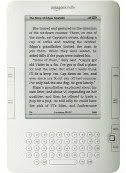I can't remember the last time I started a book and didn't finish it. Even if a book sucks, I'll plod through to the end (hoping it will make a sudden qualitative upturn, or else to be able to complain about the entire book when I'm done). In this case, though, I couldn't do it.
The risk you take when you read nonfiction: scientific processes may be explain in mind-numbing detail, historical happenings may include painful asides and irrelevant backstories, and opinionated essays sometimes rant for fifty pages to make a ten page argument. Sadly, the book I was reading did all of the above.
That's not to say that Nassim Nicholas Taleb's The Black Swan: The Impact of the Highly Improbable isn't a good book. The premise--that there are certain things in this world that cannot be predicted at all--is a good one, and there are some great explanations, good points made about how we interpret indicators, and some very simple examples of why we really can't trust a lot of the predictions we tend to make. There are also, however, long-winded rants about philosophical theory, constant references to the author's personal upbringing and former career, and (coming in around the 66% mark--I was reading on the Kindle) a banal narrative about applying his theory to reality . . . one that seemed, when I put the book down, without end. All in all, this book was in deperate need of a red pen and should have been about half its length.
I feel just a little bit like a failure, having put the book down without finishing it. In a way, I feel like the book won. Which is a stupid way to think, really.
What have I learned from reading this book? I've learned two things: (1) we probably never could have predicted 9/11, only reacted in the aftermath, and anyone who had suggested (on 9/10 or before) that we make cockpit doors lockable and bulletproof would have been dismissed as over precautionary; (2) when I decide to put down a book and not finish it, I must not take it as a personal failure and just move on.
So I've picked up Aldous Huxley's Brave New World, and after that I'll read Orwell's 1984. It's been 20+ years since I've read either one, so they'll both seem new to me.
Observations, rants, and plausible
deniability from a person who refuses
to be a prisoner of his own world.
deniability from a person who refuses
to be a prisoner of his own world.
The Village
about
Here and Now
I AM WRITING!
My Screenplay -- Draft Three
I'm currently reading:

On my Kindle 2
I'm listening to:

iTunes Radio
I'm driving:

The Honda FCX Clarity
Links
Visitor Map
Personal Development
Add age, remove time;
Instant headache.
Reading
(* indicates Kindle-read)
- The Complete Sandman by Neil Gaiman
- Cross Fire by James Patterson
- Pearls Sells Out by Stephan Pastis
- Limitless (The Dark Fields) by Alan Glynn*
- True Grit by Charles Portis*
- Makers
by Cory Doctorow - Dead or Alive by Tom Clancy (with Grant Blackwood)
- Full Dark, No Stars
by Stephen King
Archives
- September 2005
- October 2005
- November 2005
- December 2005
- January 2006
- February 2006
- March 2006
- April 2006
- May 2006
- June 2006
- July 2006
- August 2006
- September 2006
- October 2006
- November 2006
- January 2007
- February 2007
- March 2007
- April 2007
- May 2007
- June 2007
- July 2007
- August 2007
- September 2007
- October 2007
- November 2007
- December 2007
- January 2008
- February 2008
- March 2008
- April 2008
- May 2008
- June 2008
- July 2008
- August 2008
- September 2008
- October 2008
- November 2008
- December 2008
- January 2009
- February 2009
- March 2009
- April 2009
- May 2009
- July 2009
- September 2009
- October 2009
- December 2009
- January 2010
- March 2010
- April 2010
- September 2010
- December 2010
- April 2011
- May 2011
- October 2012
- May 2013
- November 2013
Previous entries
- You Got A Younger Sibling?
- Hello, "Kitty."
- And Now For Something Completely Different . . .
- Neil Gaiman And I Have Something In Common!
- Television Is Not A Right! . . . . Right?
- Why Did That Feel Weird?
- Helicopter!
- Making Money Meaningful
- Thinking Outside Disavowing The Box
- Today's Oxymoron: "New Origin Story"
credits
- Layout design by Pannasmontata
- Header © Vladstudio

